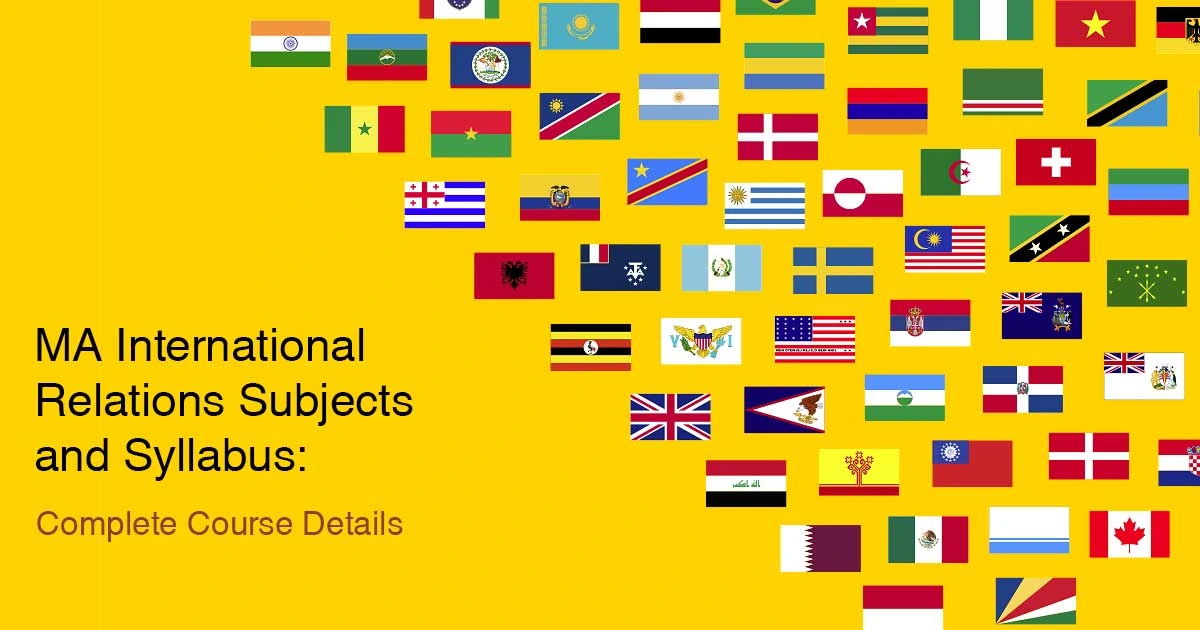Blog Detail


MA International Relations Subjects and Syllabus: Complete Course Details
15-05-2025

Table of Content:
- Overview of MA International Relations
- Core MA International Relations Subjects
- International Political Theory
- Foreign Policy Analysis
- Diplomacy and Global Governance
- International Law and Human Rights
- International Security and Strategic Studies
- Research Methodology in International Relations
- Elective Subjects and Areas of Specialisation
- MA International Relations syllabus: semester-wise breakdown
- Career opportunities after an MA in International Relations
- Skills gained through the programme
- Conclusion
- FAQs
Today's world is more interconnected than ever, and understanding global dynamics is crucial in almost every professional field. This has increased interest in postgraduate programmes like the Master of Arts (MA) in International Relations. Aimed at students who wish to engage with global issues, foreign policy, international law and diplomacy, the course is intellectually enriching and professionally rewarding.
This blog explores the MA International Relations course details, including the core and elective subjects and a detailed look at the syllabus. Whether you are aiming for a career in diplomacy, international law, or global governance, this comprehensive guide will help you understand the programme's structure, scope, and academic approach.
Overview of MA International Relations
An MA in International Relations is a postgraduate programme designed to develop a deep understanding of international political theories, global policies and cross-border interactions. This course comprises a mix of theoretical frameworks and real-world applications, usually divided into four semesters.
Students delve into international diplomacy, foreign policy analysis, peace and conflict studies and global economics. These areas help them critically examine international systems,multilateral institutions and the political implications of globalisation.
Core MA International Relations Subjects
The course is structured to provide a strong theoretical foundation while also offering flexibility to pursue specialised interests. The core MA International Relations subjects generally include:
-
International Political Theory:
An exploration of key political ideologies, realism, liberalism, constructivism and Marxism as they relate to global affairs.
-
Foreign Policy Analysis:
Students learn decision-making models influencing a nation’s foreign policy and assess real-world case studies.
-
Diplomacy and Global Governance:
This subject covers diplomatic practices, statecraft and the role of international organisations like the UN and WTO.
-
International Law and Human Rights:
This field focuses on legal frameworks governing interstate relations, treaties, human rights conventions, and international humanitarian law.
-
International Security and Strategic Studies:
Analyses security concerns such as terrorism, arms control, cyber threats and military alliances.
-
Research Methodology in International Relations:
This program offers training in qualitative and quantitative research tools required for academic and policy-oriented research.
Elective Subjects and Areas of Specialisation
In addition to the core curriculum, students can choose from diverse electives that align with their interests and career goals. These electives expand the scope of the MA International Relations syllabus and include:
-
Global environmental politics
-
Political economy of development
-
Regional studies (eg, South Asia, Middle East, East Asia)
-
Migration and refugee studies
-
Conflict resolution and peacebuilding
-
Media and international relations
-
International political economy
-
Global public policy
This flexibility ensures students can focus on niche areas within the discipline, making them more versatile in the job market.
MA International Relations syllabus: semester-wise breakdown
Here is a simplified outline of a typical MA International Relations syllabus, presented semester-wise:
Semester I
-
International Political Theory
-
Contemporary World Politics
-
Research Methodology
-
Area Studies I (Region-Specific Study)
Semester II
-
Foreign Policy Analysis
-
International Law
-
Global Governance and Institutions
-
Elective I
Semester III
-
International Security Studies
-
Political Economy of International Relations
-
Elective II
-
Seminar Paper
Semester IV
-
Dissertation/Thesis
-
Internship/Fieldwork (Optional)
-
Elective III
-
Comprehensive Viva
This structured progression helps students gradually build from foundational theories to advanced analytical work and research-based learning.
Career opportunities after an MA in International Relations
Graduates of this programme enjoy a broad spectrum of career opportunities, thanks to their interdisciplinary training. Popular roles include:
-
Diplomats and foreign service officers
-
International policy analysts
-
Intelligence officers
-
Non-Governmental Organisation (NGO) coordinators
-
Media and communication experts in international affairs
-
International business consultants
-
Academicians and researchers
-
Human rights advocates
Their deep understanding of global systems and geopolitical issues makes them valuable assets across government, international agencies and corporate sectors.
Skills gained through the programme
Studying International Relations at the postgraduate level provides academic knowledge and transferable skills. These include:
-
Critical thinking and analytical reasoning
-
Policy evaluation and strategic planning
-
Diplomatic communication
-
Cross-cultural understanding
-
Research and data interpretation
-
Conflict resolution and negotiation
These competencies are highly sought after across various global industries and institutions.
Conclusion
A master’s in International Relations opens a gateway to understanding the forces shaping global affairs. The blend of theoretical insight and practical exposure prepares graduates to navigate the complexities of international systems with confidence and purpose, by understanding the MA International Relations subjects and examining decisions about their academic and professional journey in global affairs.
Whether you aim to serve your country on the diplomatic front or influence policy from behind the scenes, this course offers the foundation and flexibility to pursue various impactful careers.
FAQs
Q1. Who is the father of international relations?
A1. The title of the “father of international relations” is often attributed to Hans Morgenthau, a prominent political theorist known for his work in classical realism and the book “Politics Among Nations”
Q2. What are the benefits of studying international relations?
A2. Studying International Relations offers numerous benefits, including a global career perspective, deep analytical skills, understanding of diplomatic processes and the ability to impact real-world policies at both local and international levels.
Q3. How many years to study international relations?
A3. An MA in International Relations typically takes two years to complete, and it is structured into four semesters of coursework and research.